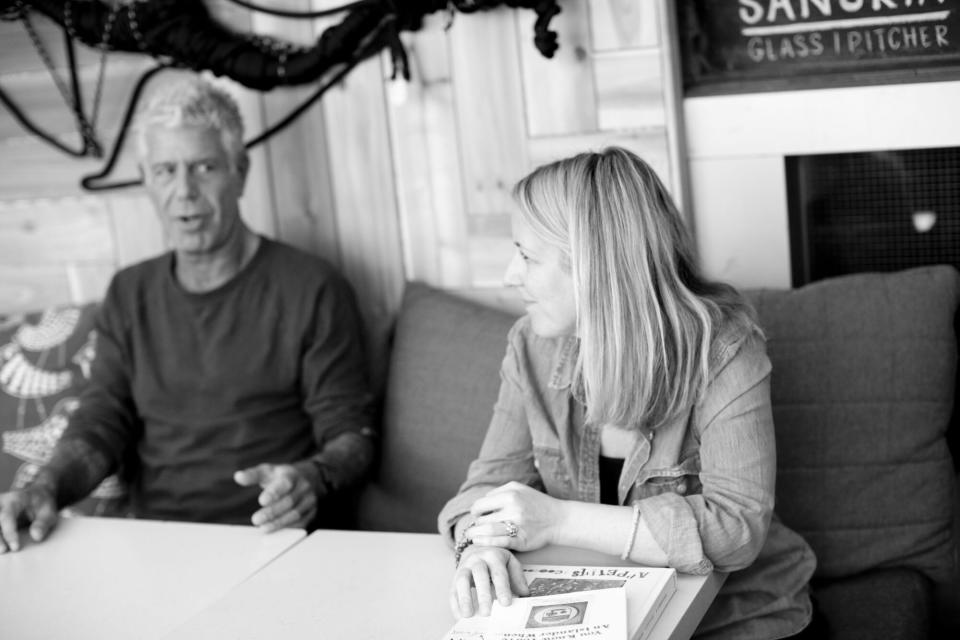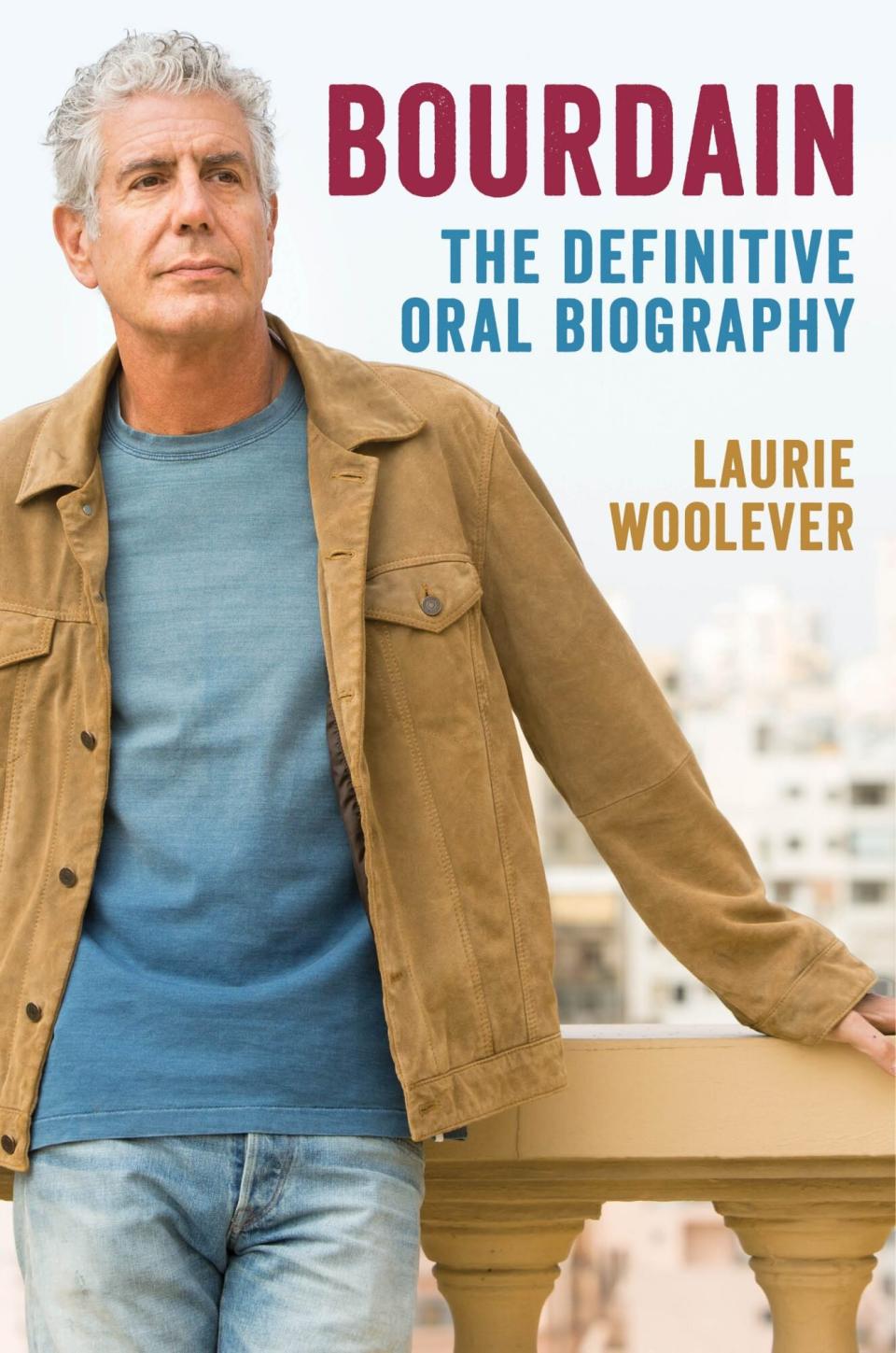Laurie Woolever on the pain and pleasure of publishing Anthony Bourdain's story

Ecco Books
Putting into words exactly what Anthony Bourdain meant to the world — and who he was — is a Herculean task, and no one knows that better than Laurie Woolever, his longtime assistant. Over the past year she brought readers a posthumous guidebook (World Travel), consulted on Morgan Neville's acclaimed documentary Roadrunner, and on September 28 she releases Bourdain: The Definitive Oral Biography. The secret to completing the impossible, she's learned, is to turn to other people for help.
In the midst of battling her own grief surrounding the loss of the man that she describes as a close friend — in addition to a boss — Woolever interviewed nearly 100 people from the television personality's life, culling together a portrait of a man more complicated, curious, and vulnerable than most of his fans realized. Here, ahead of the book's publication, she reflects on what the work meant to her, Tony's greatest achievements, and where we're all supposed to go from here.
ENTERTAINMENT WEEKLY: Before you worked on this book, you released the World Travel book about Anthony's favorite places — how did you decide you were ready to complete that project?
LAURIE WOOLEVER: It was really difficult. It was something that Tony and I had started working on before he died and were really excited about, so I felt that as long as I could, that I should finish it. I took a few months off and once I worked through the shock and grief I had a job to do. It wasn't the project that I expected to do, but I just kept thinking 'what would Tony do?'
What kind of reaction did you see, personally, from his fans when that released?
There was such an outpouring of emotion when he died, and it made me realize he had an even bigger impact when he was alive than I could grasp. So to have a book with his own words in it, that has his memories and favorite things — I think people were really hungry for something like that.
What kind of discussions did you have, with yourself or Tony's inner circle, about deciding to put together this oral biography?
Very shortly after Tony's death it became clear that a lot of people were going to try to write or document his story in some way. Tony's agent — who is also my agent — and I were in a few discussions and we wanted one of those items to come from people who really knew him and not some unauthorized biography.
Without knowing him personally, it's still easy to surmise that he would be uncomfortable with a lot of posthumous praise, warranted as it is. What do you think his reaction would be to this book?
I think it would have been mortifying for him to know that people were fawning over him, but to be clear although there are a lot of people who love him and share very warm memories in the biography, it's not a hagiography. There are definitely stories about moments in which he could be self-absorbed or hurtful. That might actually have been more comfortable for him to hear, as opposed to being lauded. He was always a bit embarrassed by his fame and ambivalent about the spotlight.
How did you go about deciding who to interview for the book?
I had (and have) great relationships with a lot of Tony's producing partners and crews, so that's where my list started. I also started with his family members, and they helped introduce me to his friends from school and friends from his early days of being a cook in New York. Tony's first wife, Nancy, was hugely helpful in that regard — she's maintained friendships with a lot of guys from the old days. It was really more word of mouth than anything else, everyone had another friend of Tony's they felt would be important to talk to.

Did you learn anything that surprised you?
I really thought I knew everything about the guy, having worked with him for so long and being steeped in his work. But every single person I spoke to told me something new. One thing that came up again and again with the cooks from New York in the '80s, was that Tony was really competitive about tanning, of all things. That is so funny to me. He always had a healthy glow but apparently at one time it was a serious competition — they'd all go out to Long Beach and see who could get the most tan.
Tony had his hand in a lot of things: cooking, producing, hosting, writing — is there one element of his career that meant the most to him?
I think the common thread that runs through his whole life is that he is a writer. He was writing poetry and comics at a young age, he always wanted to be a writer. He released two crime novels before Kitchen Confidential. He never stopped — he was working on screenplays on the side, he continued to write fiction, he wrote all the voiceover for his shows. That's the essence of who he was.
Do any interviews from the book stand out as particularly difficult or painful?
There weren't any that were hugely painful; some were very very emotional and you can see it in the book, in the way that people talked about Tony. The hardest conversations came from the guys that were with him at the end, because they had a very difficult story to tell. In the wake of a suicide it's natural to question what might've gone differently and what a person might've done; it's a futile exercise but it's impossible not to do. The crew members who had the misfortune of being with Tony in France in 2018, those were the most emotional for me. There's so much regret and sadness, and it can change over time but it never really goes away.
Morgan Neville's film Roadrunner came out this summer; do you see the documentary and book as complementary to each other?
Definitely. I think everyone in the film was also interviewed in my book and there are a lot of similar themes. I will say the book goes deeper just by the nature of the format. But if you left the film with questions, I do believe that the book will answer them. I will also say that I was a consulting producer on the documentary so I feel a sense of ownership with it as well.
There are a lot of Tony's fans who are still unable to engage with any narratives about his death because it's still too painful; do you have any comment on that?
It's a completely legitimate response. I try to be mindful of that, I've really had to steel myself against that same sadness. For me, this work has been helpful in my grieving process, it's been my singular outlet and it's a luxury to have. But for his fans, just seeing that Roadrunner trailer is a real heartbreaker. The first time I saw it I cried like a baby, and I was glad to have privacy in that moment to process it by myself. A book is a bit easier because you can put it down when you need. I think it's also really helpful to remember all the joy and romance and enthusiasm that Tony had in his life.
What do you think would be Tony's reaction to our current world — mostly the pandemic and the travel bans?
I think about it a lot. Like, what would Tony have thought about the last two years of the Trump presidency? I often think: Tony, there's a million reasons why I wish you were still around. But one of the big reasons right now is to be able to talk to him about the pandemic. Divorced from all the loss and suffering, I think he would find it really fascinating as a human phenomenon. I think in being forced to stay home for the first time he probably would have written a couple of novels. I also think he would have found a way to travel ethically and safely, and be currently urging people to get vaccinated. He's had so many travel vaccines over the years. He also would have had a strong perspective on the suffering of the hospitality and restaurant industry, he would have wanted to use his voice to help cooks and waiters.
After working with Tony for so long, and now dedicating these last few years to these projects, have you thought about what's next for you? Is it possible to move on?
When I first met Tony, I had been Mario Batali's assistant for a long time and had done a lot of recipe writing and testing, so Tony hired me to help edit his cookbook. That was back in 2002, when I was on track to be a food writer and editor permanently. It felt a little strange to go back to being an assistant with Tony but it was such a mutually respectful assistant job. I wasn't chasing him around with a telephone and a hairbrush, he was cognizant of giving me a lot of opportunities — it was a dream job in so many ways. Now, for the last three years, I've been asking myself this same question: what next? I've known that these books will both be finished and out in the world. Being associated with someone like Tony has given me the opportunity to meet a lot of interesting people working on a lot of interesting projects, so right now I'm working on a book all about bread with a baker called Richard Hart who has a bakery in Copenhagen. I've had the opportunity to start doing a little producing for television, so I'm in the early stages for a couple projects — involving food, of course. Like Tony, I'm a writer at heart, so I'm just going to keep trying to tell good stories the way that he did.
Related content:

 Yahoo Finance
Yahoo Finance 